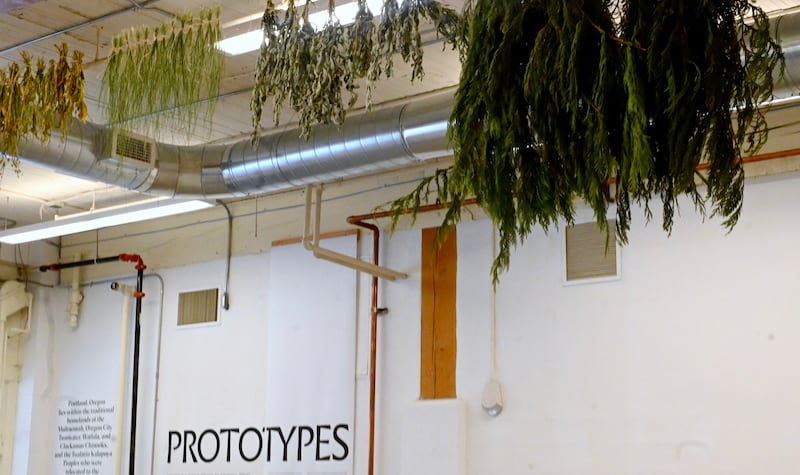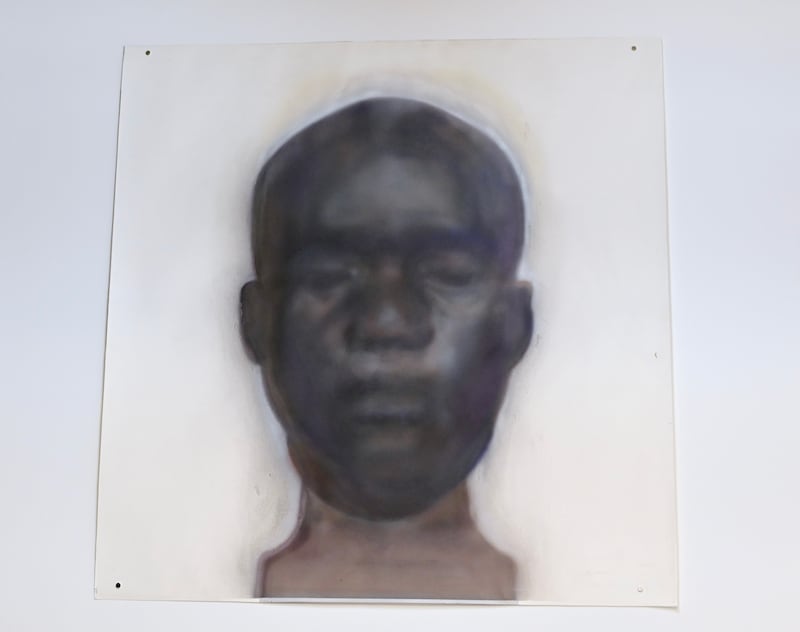At the opening for Converge 45′s Prototypes exhibition, attendees formed a line outside. The capacity of the Pearl District’s Skanska USA Building, despite its generous ceilings, allowed for no more than 24 visitors at one time. These precautions were due to the summer’s surge of new COVID-19 cases, which also caused planners to change the traditional opening night reception to an October closing toast.
However, not all the Prototypes artworks were physically housed in the Skanska USA Building.

For the exhibition of more than 40 public art proposals from specialists and newcomers, some of the artists seemed close to realizing their monuments’ final form, but most had barely begun—or would not begin, as the proposal itself was the artwork.
Linda Wysong and Angela Moos’ proposal to replant apple orchards in Kenton to memorialize the neighborhood’s agricultural roots, for instance, would require input from city planners and doubtless take much longer than the months that had elapsed since Converge 45 first put out an open call for proposals.
The call for proposals, issued last spring, drew nearly 35% of the works in the Prototypes show, says Mack McFarland, Converge 45′s executive director. The remaining 65% came from artists specifically invited by the contemporary art festival. The only proposals not displayed were ones whose artists did not respond to their acceptance in time, McFarland says.
Physically at the show are Paula Wilson’s displays of a two-channel video and a painted dress she wore in 2017, while dancing on the pedestal of a removed Confederate Civil War monument in New Orleans.
Nearby, the formerly anonymous artist, Todd McGrain, behind the recently vandalized York bust on Mount Tabor displayed a spectral drawing of his subject, whose soft features seemed at once photographically out of focus, yet faithfully representative of the bust’s planned bronze medium.

The conversation around public monuments and memorials is “pretty polarizing,” McFarland says. However, that conversation began long before activists and the city took down statues dedicated to U.S. battles and presidents. McFarland sees Converge 45′s Portland Monuments and Memorials project as a natural theme for its fifth year.
Prototypes is a part of that ongoing project. The call for art is still open and Converge 45 will accept applications on a rolling basis.
All proposals respond to two questions: What is an appropriate monument or memorial for this time and place, and what monument or memorial would you want in your neighborhood?
The resulting pieces range from traditional and avant-garde to digital and conceptual. Numerous artists contextualized Prototypes’ prompts with national and global monument movements.
Toppled Monuments Archives will give an in-depth presentation on Sept. 23, playing the sounds of fallen memorials: the Berlin Wall, Iraqi and Afghan statues, Trump-era topplings in the U.S. and, most recently, monument taken down in Canada and Brazil.
McFarland says city leaders and members of the Regional Arts & Culture Council’s public art committee will view the show and consider whether some of the proposals could replace any of the nearly dozen monuments activists took down during the 2020 protests in Portland.
Emphasizing that he personally will not decide which projects get actualized, McFarland said some of Prototypes’ strongest proposals are from the Confederated Tribes of Grand Ronde. Visions of artisan heron sculptures and canoes longer than 50 feet could naturally complement downtown Portland’s waterfront parks while raising the profiles of Indigenous artists.
“We don’t see this exhibition as the end to this conversation,” McFarland says. “We wanted to have a moment with our probably over-optimistic brains coming out of the pandemic, to bring people together to have these conversations as we begin to rehabilitate public space together. Seems like a really apropos moment to look at what took place in our public spaces, specifically around monuments and memorials during this time, and how we might move forward with the reconciliation of that.”
GO: Prototypes at the Skanska Building, 1010 NW Flanders St., converge45.org. 11 am-6 pm Thursday-Saturday and by appointment.
